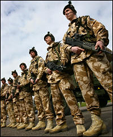The military: your
kids are next
Morning Star
by Louise Nousratpour
19 May 2008
PEACE campaigners and teaching unions attacked government plans to militarise Britain on Monday by increasing army involvement in schools and introducing US-style homecoming parades.

DESPERATE: The government calls for more army involvement in schools.
A government-backed review published on Monday by Tory defector Quentin Davies MP argued that pupils in state schools should be encouraged to sign up for military training with the cadet corps.
The study, which has the full backing of Prime Minister Gordon Brown, also recommends a national Armed Forces Day and legislation to make discrimination against uniformed personal a criminal offence.
Mr Brown is personally very keen on US-style victory parades and military medals to celebrate Britain's military "achievements."
But Stop the War Coalition spokesman David Wilson warned that this was just a desperate attempt to justify the current wars and prepare for future wars with the other "axis of evil," in particular Iran.
Currently, there are only 60 cadet forces in the comprehensive school system in England and Wales, compared with 200 in the grammar and private sector.
The study claimed that an expansion of cadet training, which would see pupils who sign up given weapons training, would improve both discipline among teenagers and public perception of the armed forces.
The proposals provoked anger among campaigners and teachers, who have long insisted that school-based cadet forces are a thinly disguised recruiting instrument.
The National Union of Teachers vowed to resist army visits to schools at its annual conference in March, while lecturers' union UCU will be discussing military recruitment and the "glorification of weapons and war" on campuses at its conference next week.
Last year, British army chief General Sir Richard Dannatt warned that a lack of public appreciation for Britain's adventures in Iraq and Afghanistan was in danger of "sapping" the willingness of troops to serve.
"Soldiers are genuinely concerned when they come back from Iraq to hear the population that sent them being occasionally dismissive or indifferent about their achievements," he claimed.
Mr Wilson countered: "I'd like to correct Mr Dannatt's facts - the public did not send the soldiers to war. Former prime minister Tony Blair, acting almost alone, sent them.
"A massive majority were opposed to the wars. It is little wonder that the public is not supportive of the army and that soldiers feel demoralised when the government defied international law and the democratic will of Britons."
Military Families Against the War spokesman Andrew Burgin expressed the group's strong opposition to victory parades and army recruits in schools.
"The greatest service the government can do for the armed forces is not make them fight illegal or immoral wars," he argued.
"The families oppose attempts to recruit children into the Armed Forces and they don't want victory parades. What they would like to see is an inquiry into the real reasons for going into Iraq."
NUT acting general secretary Christine Blower said that, rather than teaching kids how to fire weapons and fight wars, the government should invest in youth clubs.
"The collapse of local youth services has left many young people with nowhere to go other than the street corner," she said.
"A reinvigoration of youth services would provide opportunities for young people, which we would fully support."
Ms Blower also criticised the armed forces for deliberately targeting kids in disadvantaged areas, where limited job prospects and high unemployment makes a career in the military an attractive alternative.